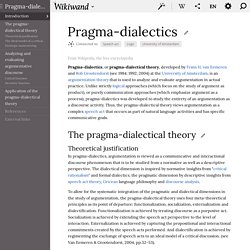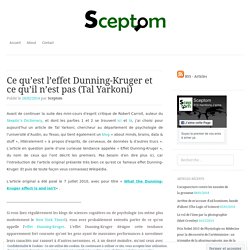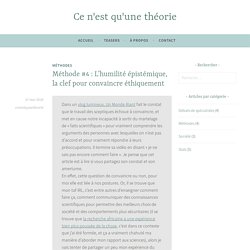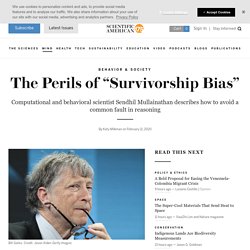

(1) Science is a liar...Sometimes, Its Always Sunny in Philadelphia. Pragma-dialectics. Pragma-dialectics, or pragma-dialectical theory, developed by Frans H. van Eemeren and Rob Grootendorst (see 1984; 1992; 2004) at the University of Amsterdam, is an argumentation theory that is used to analyze and evaluate argumentation in actual practice.

Unlike strictly logical approaches (which focus on the study of argument as product), or purely communication approaches (which emphasize argument as a process), pragma-dialectics was developed to study the entirety of an argumentation as a discourse activity. Thus, the pragma-dialectical theory views argumentation as a complex speech act that occurs as part of natural language activities and has specific communicative goals. Les sceptiques : experts de l'esprit critique ? Ce qu’est l’effet Dunning-Kruger et ce qu’il n’est pas (Tal Yarkoni) Si vous lisez régulièrement les blogs de sciences cognitives ou de psychologie (ou même plus modestement le New York Times!)

Méthode #4 : L’humilité épistémique, la clef pour convaincre éthiquement – Ce n'est qu'une théorie. Dans un vlog lumineux, Un Monde Riant fait le constat que le travail des sceptiques échoue à convaincre, et met en cause notre incapacité à sortir du martelage de « faits scientifiques » pour vraiment comprendre les arguments des personnes avec lesquelles on n’est pas d’accord et pour vraiment répondre à leurs préoccupations.

Il termine sa vidéo en disant « je ne sais pas encore comment faire ». Je pense que cet article est à lire si vous partagez son constat et son amertume.En effet, cette question de convaincre ou non, pour moi elle est liée à nos postures. [Opinion] Comment communiquer avec des gens qui sont cons ? – Le Malin Genie. Fin mai 2020, Un Monde Riant sortait une vidéo dans laquelle il se questionnait sur les raisons et sur la manière de communiquer sur les sujets scientifiques controversés.
![[Opinion] Comment communiquer avec des gens qui sont cons ? – Le Malin Genie](http://cdn.pearltrees.com/s/pic/th/opinion-comment-communiquer-224974113)
Intellectual humility: the importance of knowing you might be wrong. Julia Rohrer wants to create a radical new culture for social scientists. A personality psychologist at the Max Planck Institute for Human Development, Rohrer is trying to get her peers to publicly, willingly admit it when they are wrong. To do this, she, along with some colleagues, started up something called the Loss of Confidence Project. It’s designed to be an academic safe space for researchers to declare for all to see that they no longer believe in the accuracy of one of their previous findings.
The effort recently yielded a paper that includes six admissions of no confidence. And it’s accepting submissions until January 31. “I do think it’s a cultural issue that people are not willing to admit mistakes,” Rohrer says. The project is timely because a large number of scientific findings have been disproven, or become more doubtful, in recent years. It’s been fascinating to watch scientists struggle to make their institutions more humble.
Intellectual humility, explained.
CriticalThinkingOrg. (69) (PDF) Critical Thinking.Concepts and Tools by Richard Paul & Linda Elder. The Perils of "Survivorship Bias" An aspiring entrepreneur could be forgiven for thinking that dropping out of college to start a company is the key to success.

After all, it worked beautifully for Steve Jobs, Bill Gates and Mark Zuckerberg. These business moguls’ well-known stories give the impression that to become a triumph in business, all you need is a big idea in college and the will to quit school to pursue it. The problem is that college dropouts do not usually become billionaires—there are many more budding entrepreneurs who dropped out of college to start companies and failed than those who succeeded. When you focus on the people who left school and made it big and ignore the far larger set of dropouts who never got anywhere, you are succumbing to what is known as “survivorship bias.” Sendhil Mullainathan, a professor of computation and behavioral science at the University of Chicago Booth School of Business, has thought a lot about how to avoid such logical errors.
People Now Have ‘Eco-Anxiety’. I’m One of Them. CRITICAL THINKING. Why clear definitions are key to intelligent discussions. Until about a century ago, 'cretinism' was endemic throughout large parts of the Alps.Sufferers often had a visibly enlarged thyroid gland, and in the worst cases were severely retarded.Although 'goiter belts' in North America and Europe have been eradicated, the disease remains common throughout the world.

Age-old blight Cretins with goiter, Styria (Austria), early 19th century. Image: Oesterreichs Tibur (1819), public domain. Found here on Wikimedia Commons. How do you make Captain Haddock swear like the drunken sailor he is, without R-rating the comic that stars his much milder-mannered friend Tintin? Eventually Hergé, Tintin's spiritual father, found the answer. CRITICAL THINKING - Fundamentals: Introduction to Critical Thinking.
Critical Thinking is Nothing Without Knowledge. Become an intellectual explorer: Master the art of conversation. Why clear definitions are key to intelligent discussions. Critical Reading: 50 Sentence Stems Talk About What They Read. Critical Reading: 50 Sentence Stems To Help Students Talk About What They Read by TeachThought Staff I love sentence stems for many reasons, not the least of which is their ability to function as cognitive ‘training wheels’ for developing minds.
